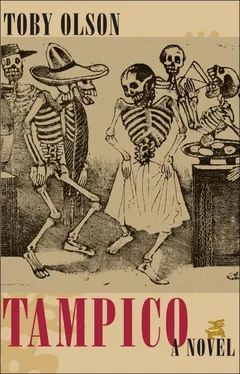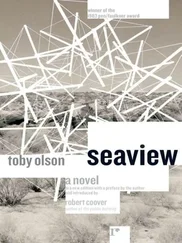“Don’t he look like Carolyn,” Larry said, working at a piece of chicken.
“He ain’t Kelly though,” said Frank. “Too early with the fucking food.”
“How long?” John said. He’d pushed the chicken to the side and was rolling the carrots around, looking for the good ones.
“Two weeks,” said Gino, without hesitation.
“How the fuck do you know?” Frank said.
“Carolyn. We had a little talk.”
“It was a surprise to me,” said Larry.
“And that’s not all you missed,” said Frank.
“What else?”
“They’re showing the fucking place.”
“Are you serious?”
“And they weren’t pleased at our behavior,” John said.
“We drove the fuckers off,” said Gino. “A few young punks in suits.”
“How did you do that?”
“Filthy language.”
“Can you imagine the gall?” Frank said. “Trying to sell it in our face like that? The promise of a closing when the old bastards are dead?”
“A comment upon the business of medicine, ethics of the culture,” Gino said. “I thought it was interesting.”
The government had come, a man in uniform and two in suits, and Gino had seen them talking to Kelly out on the ambulance dock. He spoke to Carolyn that night, and she told him Kelly was going on vacation, and the next evening Mark was there. They knew little else, but they had seen the barricades go up, and Gino had been watching closely ever since and growing a little moody.
They ate what they could manage, and Larry could manage nothing but a cookie and water, and once Mark had taken the trays away and they’d lit cigarettes and Gino had lit his pipe, Larry stubbed his cigarette after a few puffs and worked himself out of his chair and headed down the ward to bed.
“It’s the fucking chemo,” Gino whispered at the window when he was gone.
It was only nine, and they were getting through the laziness of their digestion, energy coming back again, and Frank proposed a game of chess, and he and Gino sat across the table from each other, bickering quietly over the board. John smoked and read the Boston Globe , and sparks burned tiny holes in the paper, and he shook it free of ashes as he turned the pages.
There was moonlight in the room and a small lamp over the chessboard. John had rigged a shaded bulb that hung from an IV stand beside his chair, and they could hear the intermittent whir of the suction machine, and each thought of the ghostly man in coma there and of Larry and the chemo, but only in brief moments, then moved back to their activities, in which they could lose themselves in ideas of the common mind.
Then it was a little later, and Larry was standing in the doorway, tying his robe and adjusting it. He no longer wore his beaded cap, and his hair hung to the sides from a central part, a stripe of baldness running down to his forehead.
“Couldn’t sleep?” asked Frank.
They’d finished their game and Frank had proposed another, but Gino had declined and now sat at the window again. He was looking out, but turned when he heard Frank, and then saw Larry.
“The fucking chemo,” he said softly.
“I think you’re right,” said Larry. “That’s the end of that shit for me.”
He crossed to his chair and sat down and took up the deck of cards, and they heard that hushed shushing of fabric they all knew.
“Must be eleven,” said Frank.
Carolyn came into the room then like a paper doll. Her hair was gathered in a bun this time, strands falling along her cheeks, forming a delicate basket around her face. She paused and the shushing stopped and she leaned over and placed the tray of cookies and milk on Larry’s table, then stood up straight again in her starched white uniform and looked at them expectantly. Larry looked at Frank, then over at Gino, who had turned back to the window. Then he looked up at her and smiled.
“I guess we’re all set,” he said, and she smiled at him and Frank too, and smiled quizzically at Gino’s back, then pirouetted and shushed out through the doorway to the ward, and when she was gone the two looked toward the window.
“Gino?” Frank said.
But he didn’t turn. His elbows rested on the towel on the radiator, his chin in his hands, and they could see the curls of fine grey hair at his smooth neck. His robe hung loosely from his shoulders, his body somewhere under it, and he wore black oxfords and black socks and they could see the pattern of veins running to blotches of dark scar tissue on his white calves above them. Then he did turn, lifting the chair up under him and turning it too, and then leaned back in the chair and crossed his legs, his arms crossed over his chest.
“Is there something out there?” Larry said.
“Just the whole world,” said Gino.
“What does that mean?” said Frank.
“It means I’m going to leave this place,” he said. “Get the fuck out of here.”
“Yeah, sure.”
“I’m serious.”
Larry could see that he was, and Frank could too, and Larry blinked through falling hair, and Frank started to say something, but didn’t.
“But where would you go?” John said, finally. “Your daughter?”
Gino lowered his hands to his naked legs. His robe had parted and fallen to the side, and his fingers touched his knees, then floated down to his scarred shins. He looked very much like Harry Truman now, the same expressionless face and vacant brow, but he wore no glasses and his eyes were blue and large.
“I haven’t told you that story yet,” he said. “You’ll know when you hear it. And anyway, she’s probably dead by now. All the rest seem to be.”
“If we could buy this fucking place,” said Frank, glancing at Larry.
“But that’s the point,” Gino said. “I feel retired from life here, but we’re not dead yet, are we? All this fucking around and joking and argument. This business with Carolyn, like a bunch of kids. I’m a hundred years old now, man, but I ain’t dead yet. I’m getting out of here.”
“But where?” John said.
“Chicago. But not the suburbs or the country this time, the city. I’ve got the little pension and the social security, and I’ve checked the papers. I can get a room there. I can go out to museums and get a drink. I can take a walk along the lake.”
“But if you get sick,” Frank said.
“Oh, fuck that,” Gino said. “I’m sick already. I’m a very old man. I want some life now while I have it. Not this waiting around to die.”
Frank started to say something, to bicker, then he smiled faintly and said something else.
“Well, I must admit, I think of it too.”
“Have you?” Gino said.
“No. Not really. But I can understand the rest. This place I mean. It’s not exactly wholesome.”
“I have,” Larry said. “Especially since this chemo. I can go back to Philadelphia, actually do some work again.”
“The fucking chemo,” Gino said. “Just another instance. They’re not treating us here. This is a holding tank. They only do it because of the contract. Like that useless speech therapist. Legality, not medicine or ethics. Nothing like that.”
“That would close the place,” John said.
“But for the guy out there on the ward,” said Gino. “I hope he lives to be a hundred and ten. Fuck these doctors, these businessmen.”
“You’re serious about this, aren’t you,” Larry said.
“You bet your ass I am.”
He shuffled off to his locker to get the Chicago papers and his ledger book, and Frank set the chessboard and pieces to the side and got a yellow pad and a pencil and began making lists. Larry shuffled the cards absently, thinking about the uncertainty of endings and of beginnings, more difficult for Frank he thought than for himself. He wasn’t sure about Gino, even when he returned and showed them the ads he’d carefully marked, describing the various locations with a quiet enthusiasm.
Читать дальше












